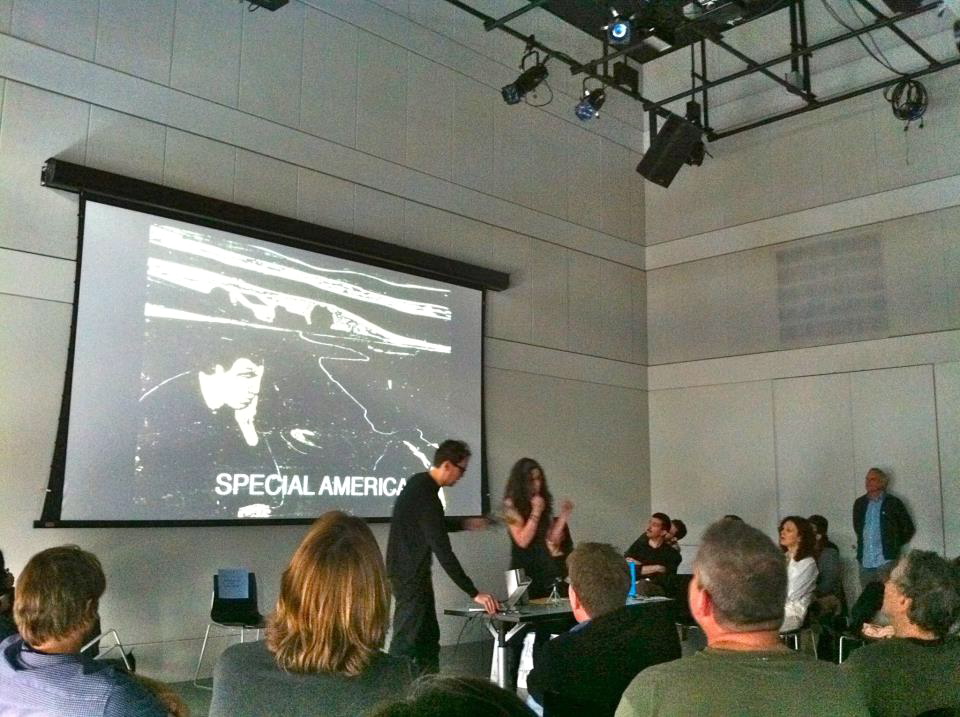![]()
![]()

SPECIAL AMERICA (Claire Donato & Jeff T. Johnson) is an exercise in and an exorcism of notions of American Exceptionalism, based on the spirit of intellectual play—semiotic, humorous, and performative. Rooted in the electronic literature community, SPECIAL AMERICA is an ongoing, collaborative, digitally mediated theoretical performance with elements of institutional critique, radical appropriation, and song and dance. At academic conferences, SPECIAL AMERICA presents itself as an analog hack or meme, a gesture toward embodied viral media.
The project began simply during the 2008 election, as an installation of 1” buttons that said SPECIAL AMERICA. The buttons were distributed on pin cards left in public locations in Providence, RI. We wanted to see if people would wear the buttons without knowing what they referred to, and we found that people wore the buttons without knowing anything about SPECIAL AMERICA.
The first performance-based iteration of SPECIAL AMERICA took shape at E-Poetry 2011 at The University of Buffalo (Buffalo, NY) as a parafictional, durational, site-specific, adaptive performance. We presented SPECIAL AMERICA as a campaign, and we canvassed attendees for material used in our performance presentation, which resembled a hyper-mediated, tag-team stump speech. Conference attendees contributed to SPECIAL AMERICA as dialectical performance text, and the viral message spread like the buttons we continued to disseminate (now with slogans like SPECIAL AMERICA IS E-POETRY and E-POETRY IS SPECIAL AMERICA).
“The Melancholy of SPECIAL AMERICA,” the most recent iteration of SPECIAL AMERICA, has been presented twice in 2012, both at the Interrupt ii Studio at Brown University (Providence, RI) in February and at the Electronic Literature Organization Conference at West Virginia University (Morgantown, WV) in June. This version emphasizes intertextual appropriation and remix, and elaborates the digitally-mediated performance, which culminates in a 25-minute presentation. As a staged performance, “The Melancholy of SPECIAL AMERICA” consists of multiple digital projections presented alongside appropriated musical loops and remixes that propel the performance through various scenes, acts, and interludes. Our script—whose language is appropriated from sources as wide-ranging as Robert Burton, Jacques Derrida, Andrew Lloyd Weber and Rosmarie Waldrop—is delivered using heightened-affect character voices inspired by voiceover reels. The staging, choreography, and costuming embody our theoretical concerns. For example, we most recently donned all-black clothing and black-and-white mime makeup, and mounted a yoga sequence, a wine tasting, a faux-academic panel, and various dances, including a formal dance and a YouTube-inspired rendition of the Twin Peaks character Audrey Hornes’s infamous solo dance. We also incorporated an original audio collage based on a pre-conference SPECIAL AMERICA POLL to which attendees contributed language and concepts subsequently sourced for the script. In the future, we plan to build our own sets and lighting sources from recycled digital equipment including old laptops, telephones, computer speakers, etc.
On a theoretical level, the purpose of SPECIAL AMERICA is multi-pronged. Foremost, SPECIAL AMERICA aims to enact what Kim Cascone refers to as the “post-digital,” or the cultural circumstance in which “digital technology is no longer a revolutionary phenomenon but a normal part of everyday life." SPECIAL AMERICA is a durational performance of post-digitality via the rapid spread of physical artifacts—e.g., one-inch buttons and posters—emblazoned with SPECIAL AMERICA slogans. This artifactuality concretizes and complicates the online, viral presence of SPECIAL AMERICA via social networking platforms like Facebook and Twitter. Consequently, over the course of an installation performance, the phrase accumulates significance at conferences in the same way Internet memes do. In 2012, many conference attendees alluded to SPECIAL AMERICA in their presentations, and in turn, SPECIAL AMERICA implicated and absorbed aspects of other presentations. SPECIAL AMERICA aims to imbue humor and play into academic conferences, without sacrificing the rigorous exploration of its theoretical framework.
Secondly, “The Melancholy of SPECIAL AMERICA” in particular aims to destabilize literary genres. In early performances, we noted that response to SPECIAL AMERICA began as polite, guarded bemusement—What does it mean if I wear this button? What is SPECIAL AMERICA?—and settled into comfort and amusement, as well as some head wagging. “Is SPECIAL AMERICA e-literature?” some conference attendees questioned. We are interested in continuing to position SPECIAL AMERICA at the threshold of electronic writing in order to drive the conversation of what e-literature has been, is, and may be in the future. Correspondingly, “The Melancholy of SPECIAL AMERICA” posited itself as “the melancholy of genre.” SPECIAL AMERICA has subsequently been listed at the ELCMCIP database as representing a “new aesthetic”.
Moving forward, we hope to further develop our critique of literary genres with an eye towards blurring the boundaries of genre across artistic disciplines and beyond. As interdisciplinary scholar-practitioners, we see ourselves as uniquely situated to comment upon genre as it relates to both practice and criticism. Our goal is to span genres as a way to critique genre boundaries and open new spaces for literary and scholarly performance. In all of its manifestations, SPECIAL AMERICA aims to explore American exceptionalism in the hope that the literary communities in which we perform reciprocally question their own modes of community-driven exceptionalism. We take part in a community as we deconstruct the assumptions and contradictions that animate it. In this sense, SPECIAL AMERICA is a complex grassroots effort in the tradition of Antonin Artaud’s Theater of Cruelty. While invoking and problematizing literary communities’ values and false realities, SPECIAL AMERICA seeds the communal discourse with theoretically engaged humor and the shared experience of live performance.